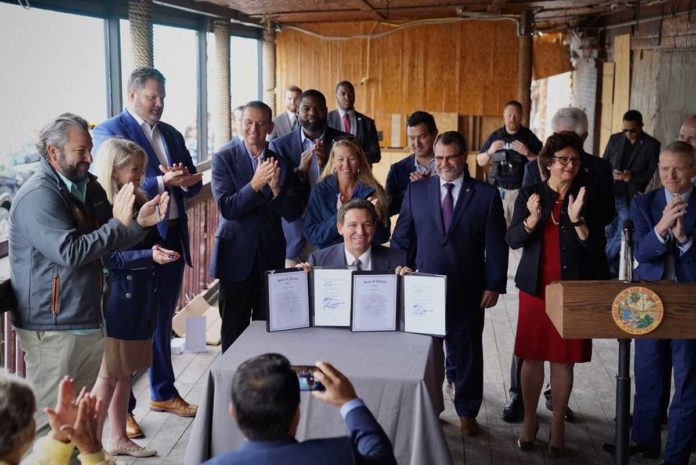
A special session in Tallahassee seeking property insurance reform culminated with the signing of a bill by Gov. Ron DeSantis on Dec. 16 in Fort Myers. While some say the bill enacts measures not seen in recent history, others believe there’s still more to accomplish to keep rates from further spiking.
Proposals debated in committee and on the floor of the Florida House and Senate combatted one larger issue facing the industry in lawsuits, which Republican supporters reiterated during the session. Legislation did away with one-way attorney fees, which force property insurers to pay attorney fees when policyholders’ lawsuits are successful over a claim. The bill also ended the state’s assignment of benefits laws, which allowed property owners to sign over their claims to contractors to handle with insurance companies.
DeSantis, in a press conference, acknowledged that the state had to do something to decrease the legal costs for insurers. He noted that Florida’s property insurance market was “very good for lawyers.” Backers of the property insurance bill hammered a statistic that, of the roughly 7% of nationwide claims, 76% of homeowners’ lawsuits in the U.S. were filed in Florida.
“It’s made a lot of people very, very rich. But the question is, is that in your best interest to have a situation like that?” DeSantis said.
Not only has the state seen six insurers go insolvent this year, but the state has also written two consecutive years of net underwriting losses that exceed $1 billion.
State Rep. Jim Mooney was one of 84 members in the House who backed the bill. He applauded a component of the bill that addressed some issues with the assignment of benefits.
“There are people who come in within hours of a storm being over. They’re predatory and catch you when you’re most vulnerable as your roof’s gone and you’re feeling like the world’s coming to an end,” he said. “They tell people ‘Let me show you how I can make this better.’ The person signs over the benefits and that person disappears.”
Legislation also addressed growing issues with the state’s insurer of last resort, the nonprofit Citizens. Playing a critical role in Florida’s property insurance marketplace, Citizens provides various types of property insurance to homeowners and businesses who are in good faith and entitled to coverage, but can’t find it in the private market.
More property owners have flocked to Citizens for coverage in recent years. In June 2020, roughly 474,000 were insured through Citizens. But due to issues facing the insurance market in recent times, Citizens policies could hit 1.6 million by 2023.
Per new legislation, Citizens won’t renew policies if a policyholder is offered coverage from a private insurer that’s within 20% of their current premium.
Mel Montagne, president of Fair Insurance Rates in Monroe (FIRM), said the state is trying to operate Citizens as a normal insurance company, when it’s a state-owned nonprofit that’s paid by Florida taxpayers that should only provide wind coverage and nothing more.
“My whole contention with Citizens for years has been why have you deviated from the prime directive? It was created to provide wind coverage in Monroe County. Nowhere in this legislation gets Citizens back to what it was created for.”
More than 9,000 homeowners in Monroe County have a wind-only policy through Citizens, and more than 1,000 have a multi-peril policy.
Mooney said Citizens’ current glidepath cap of 1% increases to 15% in 2026 and subsequent years remain the same for Monroe. Local officials are seeking support for legislation in the 2023 session that provides an exemption from the annual rate increase and maintains a 10% rate cap. County officials are seeking help from the state to lower premiums and annual rate increases by Citizens in recognition of the county’s strong building codes and housing affordability issues.
Mooney said secondary homeowners who have long-term leases with tenants are protected from any further increase. As for a new requirement that condo owners need flood insurance, Mooney said that issue will likely be discussed during the regular legislative session in 2023. He also said the county needs more competitive property insurance options.
“Was the legislation the perfect fix? No. But it’s not the end of discussion by any imagination,” Mooney said.


















